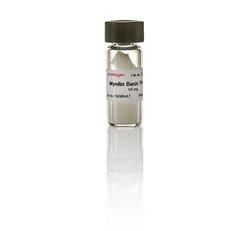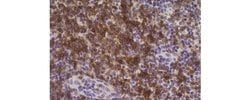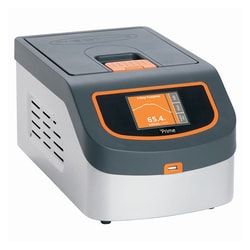CD209 (DC-SIGN) Monoclonal Antibody (eB-h209), Biotin, eBioscience™, Invitrogen™
Manufacturer: Invitrogen
Select a Size
| Pack Size | SKU | Availability | Price |
|---|---|---|---|
| Each of 1 | 13-209-982-Each-of-1 | In Stock | ₹ 32,129.00 |
13-209-982 - Each of 1
In Stock
Quantity
1
Base Price: ₹ 32,129.00
GST (18%): ₹ 5,783.22
Total Price: ₹ 37,912.22
Antigen
CD209 (DC-SIGN)
Classification
Monoclonal
Concentration
0.5 mg/mL
Formulation
PBS with 0.09% sodium azide; pH 7.2
Gene Accession No.
Q9NNX6
Gene Symbols
CD209
Purification Method
Affinity chromatography
Regulatory Status
RUO
Gene ID (Entrez)
30835
Content And Storage
4° C, store in dark, DO NOT FREEZE!
Form
Liquid
Applications
Flow Cytometry
Clone
eB-h209
Conjugate
Biotin
Gene
CD209
Gene Alias
CD209; CD209 antigen; CD209 antigen-like protein A; CD209 molecule; Cd209a; CD209a antigen; CD209a molecule; Cd209d; CD209d antigen; CDSIGN; Cire; CLEC4L; Clec4m; C-type lectin domain family 4 member L; C-type lectin domain family 4, member L; C-type lectin domain family 4, member M; Dcsign; DC-SIGN; DC-SIGN1; Dc-signr; DC-SIGN-related protein; Dendritic cell-specific ICAM-3-grabbing non-integrin; dendritic cell-specific ICAM-3-grabbing non-integrin 1; dendritic cell-specific intercellular adhesion molecule-3-grabbing non-integrin; dendritic cell-specific intracellular adhesion molecules (ICAM)-3 grabbing non-integrin; HIV gpl20-binding protein; MGC129965; MGC130443; RGD1561104; SIGN-R1; SIGNR5
Host Species
Rat
Quantity
100 μg
Primary or Secondary
Primary
Target Species
Human
Product Type
Antibody
Isotype
IgG2a κ
Description
- Description: The eB-h209 monoclonal antibody reacts with human CD209, also known as DC-SIGN, a 44 kDa type II transmembrane protein
- DC-SIGN contains a C-type lectin binding domain and binds ICAM-3, ICAM-2, and HIV virus
- Human dendritic cells preferentially express DC-SIGN
- It has been postulated that DC-SIGN serves as a receptor for capture, trafficking, and transmission of HIV to T cells and supports primary immune response
- eB-h209 was developed against a C-terminal peptide of human DC-SIGN
- Applications Reported: The eB-h209 antibody has been reported for use in flow cytometric analysis
- Applications Tested: The eB-h209 antibody has been tested by flow cytometric analysis of cultured human dendritic cells and peripheral blood cells This can be used at less than or equal to 1 μg per test
- A test is defined as the amount (μg) of antibody that will stain a cell sample in a final volume of 100 μL
- Cell number should be determined empirically but can range from 10^5 to 10^8 cells/test
- It is recommended that the antibody be carefully titrated for optimal performance in the assay of interest
- Filtration: 0.2 μm post-manufacturing filtered
- This gene encodes a transmembrane receptor and is often referred to as DC-SIGN because of its expression on the surface of dendritic cells and macrophages
- The encoded protein is involved in the innate immune system and recognizes numerous evolutionarily divergent pathogens ranging from parasites to viruses with a large impact on public health
- The protein is organized into three distinct domains: an N-terminal transmembrane domain, a tandem-repeat neck domain and C-type lectin carbohydrate recognition domain
- The extracellular region consisting of the C-type lectin and neck domains has a dual function as a pathogen recognition receptor and a cell adhesion receptor by binding carbohydrate ligands on the surface of microbes and endogenous cells
- The neck region is important for homo-oligomerization which allows the receptor to bind multivalent ligands with high avidity
- Variations in the number of 23 amino acid repeats in the neck domain of this protein are rare but have a significant impact on ligand binding ability
- This gene is closely related in terms of both sequence and function to a neighboring gene (GeneID 10332; often referred to as L-SIGN)
- DC-SIGN and L-SIGN differ in their ligand-binding properties and distribution
- Alternative splicing results in multiple variants.



